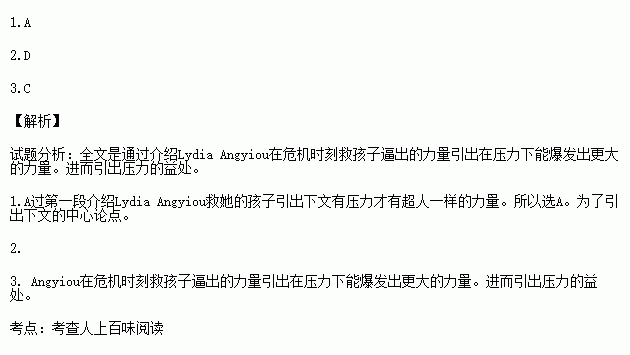题目内容
In February 2006, Lydia Angyiou and her two sons were walking through their village in northern Canada. The sound of children shouting made her turn around. To her horror, Lydia saw a 700-pound polar bear behind her eyeing her seven-year-old son. Getting between the bear and her child, Lydia yelled at the children to run away. She then began hitting and kicking the animal as hard as she could. A neighbor who heard all the noise came and shot the bear. But everyone agreed it was Lydia who had saved her children’s lives. A local policeman described it this way: “… I guess when your back is up against the wall, we come up with super-human strength.”
Where does this “super-human strength”, courage and quick thinking come from? Experts say it comes from stress! In stressful situations, the body releases chemicals that prepare it to take action. These chemicals give people the speed and strength they need to fight danger or run away from it.
When we think of stress, we usually think of its negative effects. Studies, though, show that moderate levels of stress are actually helpful. In fact, the way we perform is usually affected by the amount of stress we feel.
Stress causes the brain to release adrenaline(肾上腺素) which in turn increases our energy and excitement. The chemical gives us clearer minds and helps us to do more. This is why some people say they work better under a deadline.
Adrenaline that is not released for long periods of time can cause us to increase and strengthen our abilities instead of weakening them. We sometimes turn out our very best work when we push ourselves to the limit. Stress can also make us more confident. Handling small amounts of stress now prepares us for handling serious situations in the future. Who knows? Today’s stress may even prepare for the next polar bear that comes along!
1.In the first paragraph, the case of Lydia Angyiou is mentioned to______.
A. introduce the topic to be followed
B. remind us of the unexpected danger of life
C. praise Lydia Angyiou for her bravery
D. show the importance of super-human strength
2.What does the policeman probably mean by saying “your back is up against the wall”?
A. You are helped. B. You are inspired.
C.You are confident. D. You are cornered.
3.What would be the best title for the passage?
A. Brave Mother
B. The Cause of Stress
C. The Benefit of Stress
D. Super-human Strength

